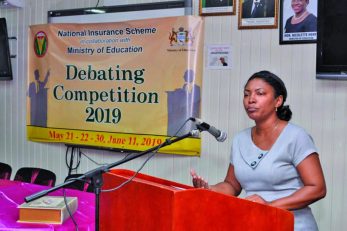Queen’s College on Thursday advanced to the final round of the debating competition 2019 after winning the semi-finals against the Bishops’ High School at the National Centre for Educational Resource Development (NCERD).





The competition, done in collaboration with the Ministry of Education, forms part of the 50th anniversary celebrations of the National Insurance Scheme (NIS).
The moot, “With improved information technology in schools, students will have an advantage to enter the world of work with greater skills,” was competitively debated between the opposing team, Queen’s College, and the proposing team, the Bishops’ High School.
The Bishops’ High, represented by its 8th graders, acquired 73 points, while semi-final winners Queen’s College won the round with a total of 86 points.
Lorelei Khanai, third speaker for the opposition, emerged Best Speaker of the competition.
Chief Judge Celest James-Williams, Head of the English Department at the New Campbellville Secondary School, commended the students of both teams for their hard work. St. Rose’s High School failed to show for their verbal battle against St. Joseph’s High School, resulting in an automatic win and a smooth path to the finals for St. Joseph’s High.
The moot, “Improved Information Technology will enhance the services offered to contributors and pensioners by the National Insurance Scheme”, will be debated in the final round of the competition by Queen’s College and St. Joseph’s High School.
Training Manager Pauline Alleyne has said the finals of the competition will be held on June 11, at 10:00h at NCERD.
However, strong and logical arguments were put forward by the bold young speakers, who were well researched and vocal in arguing their points.
Proposing the moot, debaters from the Bishops High School: Esther Hinds, Kasia Cambridge and Aaron St. Hill, explained how the use of Information Technology saves time, and how it can be used to provide a diverse learning experience for students, thus enhancing the learner/teacher experience.
They also examined the cost of information technology in comparison to the traditional way of learning, such as the use of text books.
Opposing the moot, QC debaters Christine Richardson, Asia Griffith and Lauralie Khanai argued that Information Technology does not hinder the learning of students without access.
They pointed out rather how some principles of the school system will no longer be impactful due to the use of information technology. Further, they argued that information technology can nullify what was learnt prior, as students venture into the world of work. Further, they highlighted the successes of those who did not have access to information technology and noted the ways in which students would not be at a disadvantage if they do not have access to IT.
The debaters scored points for clear and logical presentation of arguments and for original ideas, fluency, eloquence and good use of the English vocabulary, with keen attention being paid to subject and verb agreement.
Discover more from Guyana Times
Subscribe to get the latest posts sent to your email.













